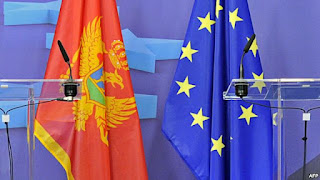BRUSSELS (AP) -- European Union foreign ministers recommended on Tuesday that Montenegro open accession negotiations with the bloc later this week, opening the way for the Balkan nation to eventually join the union.
A ministerial statement said the talks can officially start on Friday. EU heads of state and government must still approve the move when they meet Thursday, but that's considered a formality.
Despite the financial crisis and structural problems shaking the European Union's foundations, Balkan states are still enthusiastic about joining the 27-nation bloc. Croatia has completed accession negotiations and is slated to become the EU's newest member in 2013.
Accession talks can drag on, and in Croatia's case they lasted seven years. But because of Montenegro's tiny size they are likely to proceed faster, officials say.
Ministers urged the nation of 625,000 people to step up the fight against corruption and organized crime.
Ministers "endorsed the EU Commission's assessment that Montenegro has achieved the necessary degree of compliance with the membership criteria ... to start accession negotiations," a statement said.
Stefan Fule, EU commissioner for enlargement, welcomed the decision.
In Podgorica, Montenegro's Prime Minister Igor Luksic praised the EU foreign ministers' decision, calling it "a victory for Montenegro, but also for the whole region'.
"The process of enlargement continues, because there is no Europe without the Western Balkans in it," he said.
Foreign Minister Milan Rocen said the EU decision will spur the nation to speed up reforms and that "it will be remembered by generations of Montenegrins."
Source: AP



